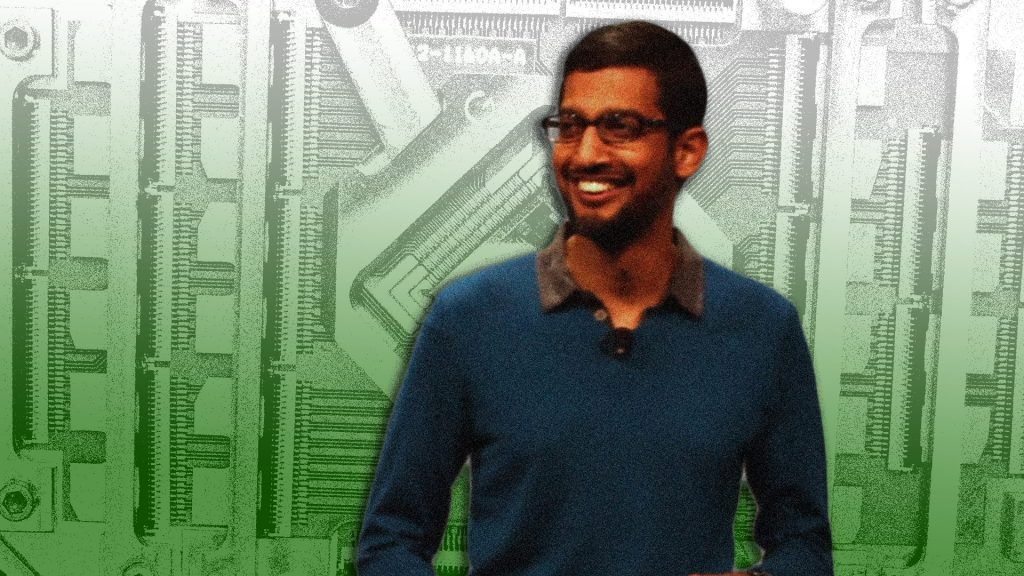Information overload: The promise and risk of quantum computing
By Lindsay Rand, Berit Goodge | November 14, 2019
 Google recently announced a breakthrough in quantum computing. Sundar Pichai, Google's CEO, reportedly compared the achievement to the Wright brothers' first flight. Credit: Composite by Matt Field. (Creative Commons photos by Maurizio Pesce and Steve Jurvetson.)
Google recently announced a breakthrough in quantum computing. Sundar Pichai, Google's CEO, reportedly compared the achievement to the Wright brothers' first flight. Credit: Composite by Matt Field. (Creative Commons photos by Maurizio Pesce and Steve Jurvetson.)
The English philosopher Sir Francis Bacon is often credited with saying “knowledge is power.” Although Bacon’s aphorism is still in circulation, the 16th century thinker clearly didn’t predict the advent of the modern-day search engine. Now knowledge is so readily available that information overload, rather, is a problem. Perhaps a more meaningful maxim would be something along the lines of: “The ability to sort and process large amounts of knowledge is power.” And that ability will be dramatically increased—for good and ill—as researchers make progress in the field of quantum computing.
The international security community in particular has been grappling with the implications of access to vast troves of information. Twentieth century practitioners prioritized scientific efforts that improved technologies such as the surveillance drone to collect data. In the 21st century, however, the security community is dealing with the ramifications of those efforts—the need to process the huge amounts of data that drones, satellites, and other technologies can acquire. But in the age of big data and information technologies, practitioners face a challenging new paradigm: Government isn’t necessarily at the forefront of development in data processing technology; private industry is. Policy makers must confront the uncomfortable reality that the future of national security now relies on the government’s ability to oversee, regulate, and adopt the research and emerging technologies developed by private companies.
Case in point: Google recently claimed to have achieved so-called quantum supremacy, marking an important development in a perennially just-over-the-horizon technology that could dramatically improve the speed at which computers can complete complex tasks. It’s also a technology that, if used by adversarial countries, could disrupt important aspects of US national security such as data protection.
Google’s claim of quantum supremacy. Google’s announcement was another milestone in the international competition to harness data processing technologies like artificial intelligence. Although the significance of the company’s accomplishment has been challenged by industry competitors, the announcement at least confirms the steady progress and commitment of private industry leaders to the development of technologies that could have major implications for national security. Quantum supremacy refers to a benchmark indicating that a quantum system can perform a given function faster than a classic computer. Google developed a quantum processor with 53 operational qubits—the principle unit of information in a quantum computer—that successfully completed a computationally intensive task in only 200 seconds. Google scientists estimated it would take the most powerful classical supercomputer over 10,000 years to complete the same task.
At this point, quantum computers are still mostly being built and tested to execute specific and carefully chosen tasks that could, in theory, be executed classically. The technological limitations of quantum computing are such that accomplishing a given task requires a custom built and programmed quantum computing system. This means that each iterative achievement will likely be respective of the highly specific task that each individually developed quantum computer will be built for and potentially respective of the specific method of operation applied. This technical reality, taken in the context of the standing definition for quantum supremacy, implies there may be several announcements by groups claiming that they’ve achieved this or that quantum supremacy.
The necessary progress to definitively surpass classic computers and achieve universal quantum supremacy, rather than piecemeal quantum supremacy, will require both hardware and software improvements. Even after significant innovation, it is highly unlikely that quantum computers will ever replace classical versions for most day-to-day operations. Rather, clever implementation will see the two working most effectively as complements to each other.
Impact on national security. The most suitable applications for quantum computers are problems with large, multi-dimensional parameter spaces that require the manipulation and optimization of significant numbers of independent variables. Consider the ways important national security information is protected and accessed, in technical terms, the ways it is encrypted and decrypted. Due to the high processing power of quantum computers, modern encryption methods that would take classic computers a long time to break would be rendered useless. The unique physical properties of proposed quantum computers would allow them to seek all possible solutions to an encryption algorithm simultaneously, giving an answer that reflects the probability of each outcome. This ability puts national-security-sensitive data at risk. In fact, hackers are already banking on this potentiality and storing available data until some point in the future when the data may be decrypted with quantum computers.
Beyond data processing and manipulation, through increased simulation and computation capabilities, quantum computers could help advance a number of scientific fields, including materials sciences. From improving drone battery-life to solving military logistics issues, researchers are predicting any number of national security applications for quantum computing.
More broadly, quantum computers could augment other emerging information technologies in the security field, like artificial intelligence and machine learning. Likewise, developments in these fields would also lead to an acceleration of quantum computer research. The interconnectedness of these emerging information technologies, and the fact that an improvement in any one of the technologies in the competition for big data primacy would accelerate the others, means it will be critical that governments monitor all information technology research and identify likely coevolution trajectories in order to secure data and infrastructure necessary for national security.
Google’s achievement signals another inflection point in that national governments are falling behind private industry as the leading developers of military-relevant technology. Unlike historical technologies that have revolutionized national security, quantum computing research is being driven by robust private industries in both China and the United States—the two countries frequently engaged in what’s sometimes called the quantum computer arms race.
Although this shift in innovation influence may not necessarily be a bad thing—it could prevent broadly relevant technologies from being siloed by the military community—it does require that military and national security practitioners adjust technology development strategies, including addressing the economic and skill barriers to adapting civilian technologies for military application.
It’s also worth noting that the focus on civilian development of quantum computers might lead to asymmetric capabilities favoring offensive (operational and manipulative) rather than defensive (protective) technologies. For instance, private industries are most focused on developing quantum computers and less focused on developing quantum-safe encryption methods. This could result in a misbalance between offensive and defensive capabilities that could be catastrophic for national security if the scale tips too far. Governments must proactively identify and prioritize innovation in areas underfunded by the private sector that will be necessary to maintain national security infrastructure.
The US government’s approach. In September 2018, the White House issued a national strategy on quantum information science that included near- and long-term development goals. The high-level overview identified a number of specific priorities set by the federal government, including bolstering the national economic, research, and education infrastructure required for quantum information technology development. It also called for collaborating with private industry and with other countries. Congress then passed the National Quantum Initiative Act to allocate funding for a national strategy that fosters public-private-academic partnerships. To address a key vulnerability of the post-quantum-supremacy world, the US National Institute of Standards and Technology is driving the development of quantum-safe encryption methods, an area that has not received comparable resources from private industry. The agency’s timeline suggests that the earliest draft of these encryption algorithms and standards will be completed by 2022.
National security priorities. The fact that there was controversy over Google’s claim to quantum supremacy indicates that the terminology used to discuss quantum computing is weak and vague. Given the hardware and software limits preventing universal supremacy, the importance of any given instance of quantum supremacy is related to the function that the quantum computer can perform. Striking a proactive and reactive balance to new developments will requires that government project leaders accept that (at least for now) universal quantum computers capable of performing a wide variety of functions are likely decades away from being developed. National security thinkers should instead identify which specific types of supremacy will have meaningful impacts. One that can perform decryption faster than a traditional computer, for instance, would be highly disruptive.
Google’s announcement and quantum computing writ large must be considered as part of the broader big data competition. The development of different emerging information technologies, and their respective impacts on national security, must not be considered in isolation. A significant development in any one of the rising technologies will likely have a domino effect and trigger innovation progress in other areas. The promise of quantum computing is the vast new knowledge it will unlock.
That’s also the risk.
Together, we make the world safer.
The Bulletin elevates expert voices above the noise. But as an independent nonprofit organization, our operations depend on the support of readers like you. Help us continue to deliver quality journalism that holds leaders accountable. Your support of our work at any level is important. In return, we promise our coverage will be understandable, influential, vigilant, solution-oriented, and fair-minded. Together we can make a difference.















